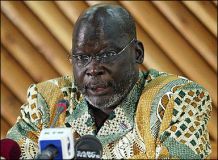Garang urges southern Sudan militias to reconcile
NAIROBI, July 1, 2005 (IRIN) — The chairman of the Sudan People’s Liberation Movement/Army (SPLM/A), John Garang, appealed on Thursday to all militias operating in southern Sudan to put aside their differences and reconcile.

|
|
Chairman of the Sudanese People Liberation Movement (SPLM) John Garang, addresses delegates at a major reconciliation conference in Nairobi, April 19, 2005. (AFP). |
“Maj Gen Gordon Kong and Maj Gen Paulino Matip Nhial [leaders of the government-aligned South Sudan Defence Force (SSDF)], I welcome you in the spirit of forgiveness and peace and as brothers,” Garang told a conference of southern Sudanese armed groups in Nairobi, Kenya.
Thursday’s conference was part of an ongoing series of meetings on south-south dialogue. Garang focused on the SPLM/A’s vision for stability in the region and security arrangements for the upcoming transitional government period.
Under the provisions of the Comprehensive Peace Agreement (CPA), signed between the Sudanese government and the SPLM/A on 9 January, all armed groups and militias in the south will either be integrated into the Sudanese armed forces or into the SPLM/A.
“I want to assure other armed groups who will decide to join the SPLA that they’ll be treated the same way as other armed groups who joined the SPLA in the past,” Garang said. “Your rightful place is in the south, you belong in the south.”
Sudanese civil-society organisations, church groups and 11 political parties attended the previous dialogue in April, which developed a consensus on issues ranging from security, democracy and good governance to human rights, gender equality and economic development.
Chaired by former Kenyan President Daniel arap Moi, Thursday’s conference was intended to bring together more than 20 armed groups from south Sudan who had been absent from the previous conference; some of these control oil-rich areas in the southern state of Upper Nile.
Participants said disagreements among southern Sudanese leaders had, in the past, led to the creation of many splinter groups, several of them supported by the Khartoum government. Observers feared that once Sudanese government troops withdrew from their southern positions in August, militias could try to fill the gap.
“I consider this a momentous occasion, key to the implementation of the peace agreement,” Moi told the participants. “It is a demonstration of your honesty and your courage to be part of this historical chapter in the history of your country.”
“When you are involved in this fighting, you have to ask yourself: what am I fighting for,” Moi added. He stressed that war should not be allowed to continue.
In a statement read for him, Maj Gen Matip said: “Our presence here is to prove our political and military dedication to the CPA and the socio-cultural, political, military and security stability of our beloved country the Sudan.”
He noted that he was eager to maintain tranquillity in the Sudanese nation, and expressed his readiness to enter into discussions for the sake of a peaceful southern Sudan.
“The SSDF demands its rightful place in the governance of southern Sudan, as well as within the general governance of the country,” he said, and added that the SPLA and the SSDF should “equitably form the high command of the Southern Sudan Armed Forces”.
Garang said the conference was not a negotiation, but rather a dialogue to heal wounds, solve differences from the past, build trust, and “put our house in order”.
The CPA, he added, provided a fair framework for equitable governance, which would lead to the reconstitution and devolution of power in Sudan.
Included in the CPA were provisions for pulling Sudanese government troops out of the south, self-determination, wealth-sharing and religious freedom.
A transition period of six years – after which south Sudan’s people would decide in a referendum whether or not to break away from the rest of Sudan – was also set out in the agreement.
“It is essential to get all the militias on board, it is crucial for the implementation of the CPA,” Kent Degerfelt, head of delegation of the European Commission in Sudan, told IRIN.
“These are the people who actually have the guns in their hand. They should stop fighting, that’s what it is all about,” he added.
Garang said the SPLM/A wanted peace in southern Sudan through the CPA, as well as peace in the western region of Darfur and eastern Sudan. It also wanted the Ugandan rebel group, the Lord’s Resistance Army (LRA), out of the country in order to achieve sustainable peace.
The LRA has fought the Ugandan government for 19 years, a brutal conflict that has displaced an estimated 1.6 million people. Some 20,000 children have been abducted for use as fighters, porters and sex slaves.
“In the south, we also want to solve the differences with the other armed groups, so that there will be no fighting anywhere in the country,” he said.
